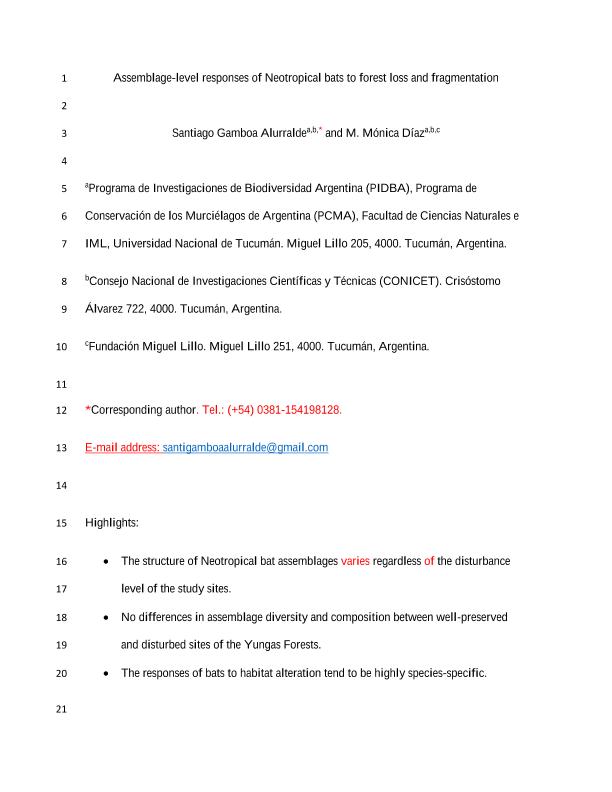Mostrar el registro sencillo del ítem
dc.contributor.author
Gamboa Alurralde, Santiago

dc.contributor.author
Díaz, María Mónica

dc.date.available
2020-10-01T19:08:27Z
dc.date.issued
2021-02
dc.identifier.citation
Gamboa Alurralde, Santiago; Díaz, María Mónica; Assemblage-level responses of Neotropical bats to forest loss and fragmentation; Elsevier Gmbh, Urban & Fischer Verlag; Basic and Applied Ecology; 50; 2-2021; 57-66
dc.identifier.issn
1439-1791
dc.identifier.uri
http://hdl.handle.net/11336/115311
dc.description.abstract
Habitat loss and fragmentation are the most important causes of biological diversity loss, changing the properties of the remaining environment. The Neotropical Region is one of the most affected areas due to the conversion of natural habitats into agricultural activities and deforestation. In this region, bats represent almost 50% of all mammal species, reaching the highest taxonomic and functional diversity. Bats are valuable indicators of biodiversity and ecosystem health, but their response to habitat loss and fragmentation was poorly studied in Argentina. The aim of this study was to analyze the response of bat assemblages to habitat alteration in Northwestern Argentina. The specimens were collected in eight different localities, four well-preserved and four disturbed sites of the Yungas Forests. To describe the structure of bat assemblages, rank-abundance curves, species richness and Shannon (H’) and Simpson (D’) diversity indexes were calculated. To test the assemblage variations among sites, PCA and NPMANOVA analysis were performed. After 96 sampling nights, a total of 565 bats from 23 species were captured. A great variation in the assemblage structure was registered, regardless the disturbance level of the sites. These variations were not significantly different according to statistical analysis. The results support the hypothesis that areas with moderate fragmentation can sustain a high diversity of bat species. Moreover, these results showed that consistent responses to landscape composition at the assemblage level are harder to identify in fragmented Neotropical Forests. The responses of bats to habitat alteration tend to be highly species-specific.
dc.format
application/pdf
dc.language.iso
eng
dc.publisher
Elsevier Gmbh, Urban & Fischer Verlag

dc.relation
http://hdl.handle.net/11336/85315
dc.rights
info:eu-repo/semantics/openAccess
dc.rights.uri
https://creativecommons.org/licenses/by-nc-nd/2.5/ar/
dc.subject
ASSEMBLAGE DIVERSITY
dc.subject
CHIROPTERA
dc.subject
COMMUNITY ECOLOGY
dc.subject
HABITAT FRAGMENTATION
dc.subject
HABITAT LOSS
dc.subject.classification
Ecología

dc.subject.classification
Ciencias Biológicas

dc.subject.classification
CIENCIAS NATURALES Y EXACTAS

dc.title
Assemblage-level responses of Neotropical bats to forest loss and fragmentation
dc.type
info:eu-repo/semantics/article
dc.type
info:ar-repo/semantics/artículo
dc.type
info:eu-repo/semantics/publishedVersion
dc.date.updated
2020-09-25T19:01:08Z
dc.journal.volume
50
dc.journal.pagination
57-66
dc.journal.pais
Alemania

dc.journal.ciudad
Berlín
dc.description.fil
Fil: Gamboa Alurralde, Santiago. Consejo Nacional de Investigaciones Científicas y Técnicas. Centro Científico Tecnológico Conicet - Tucumán; Argentina. Universidad Nacional de Tucumán. Facultad de Ciencias Naturales e Instituto Miguel Lillo. Programa de Investigación de Biodiversidad Argentina; Argentina. Universidad Nacional de Tucumán. Facultad de Ciencias Naturales e Instituto Miguel Lillo. Programa de Conservación de los Murciélagos de Argentina; Argentina
dc.description.fil
Fil: Díaz, María Mónica. Consejo Nacional de Investigaciones Científicas y Técnicas. Centro Científico Tecnológico Conicet - Tucumán; Argentina. Universidad Nacional de Tucumán. Facultad de Ciencias Naturales e Instituto Miguel Lillo. Programa de Investigación de Biodiversidad Argentina; Argentina. Fundación Miguel Lillo; Argentina. Universidad Nacional de Tucumán. Facultad de Ciencias Naturales e Instituto Miguel Lillo. Programa de Conservación de los Murciélagos de Argentina; Argentina
dc.journal.title
Basic and Applied Ecology

dc.relation.alternativeid
info:eu-repo/semantics/altIdentifier/url/https://www.sciencedirect.com/science/article/abs/pii/S1439179120300918
dc.relation.alternativeid
info:eu-repo/semantics/altIdentifier/doi/http://dx.doi.org/10.1016/j.baae.2020.09.001
Archivos asociados
